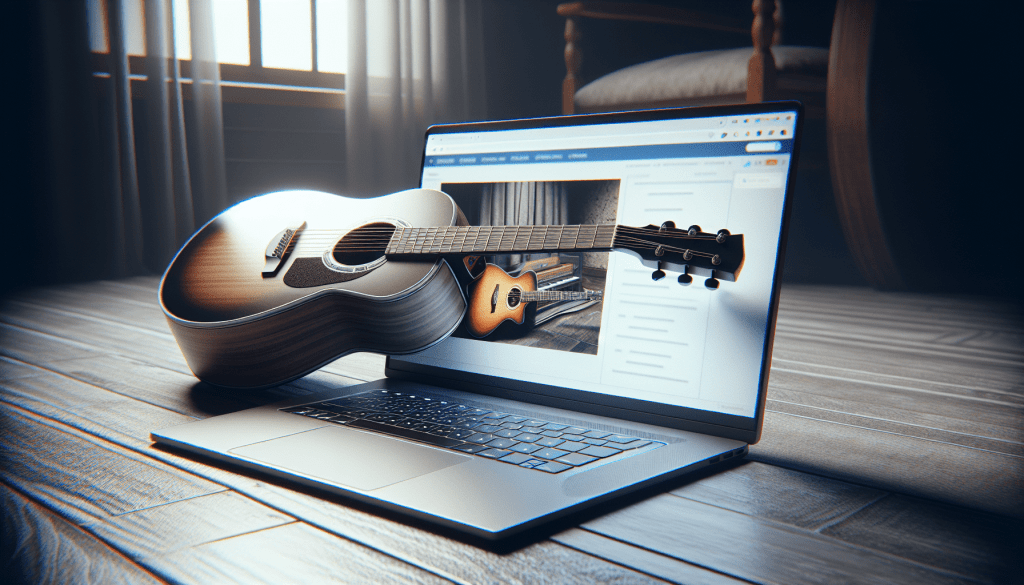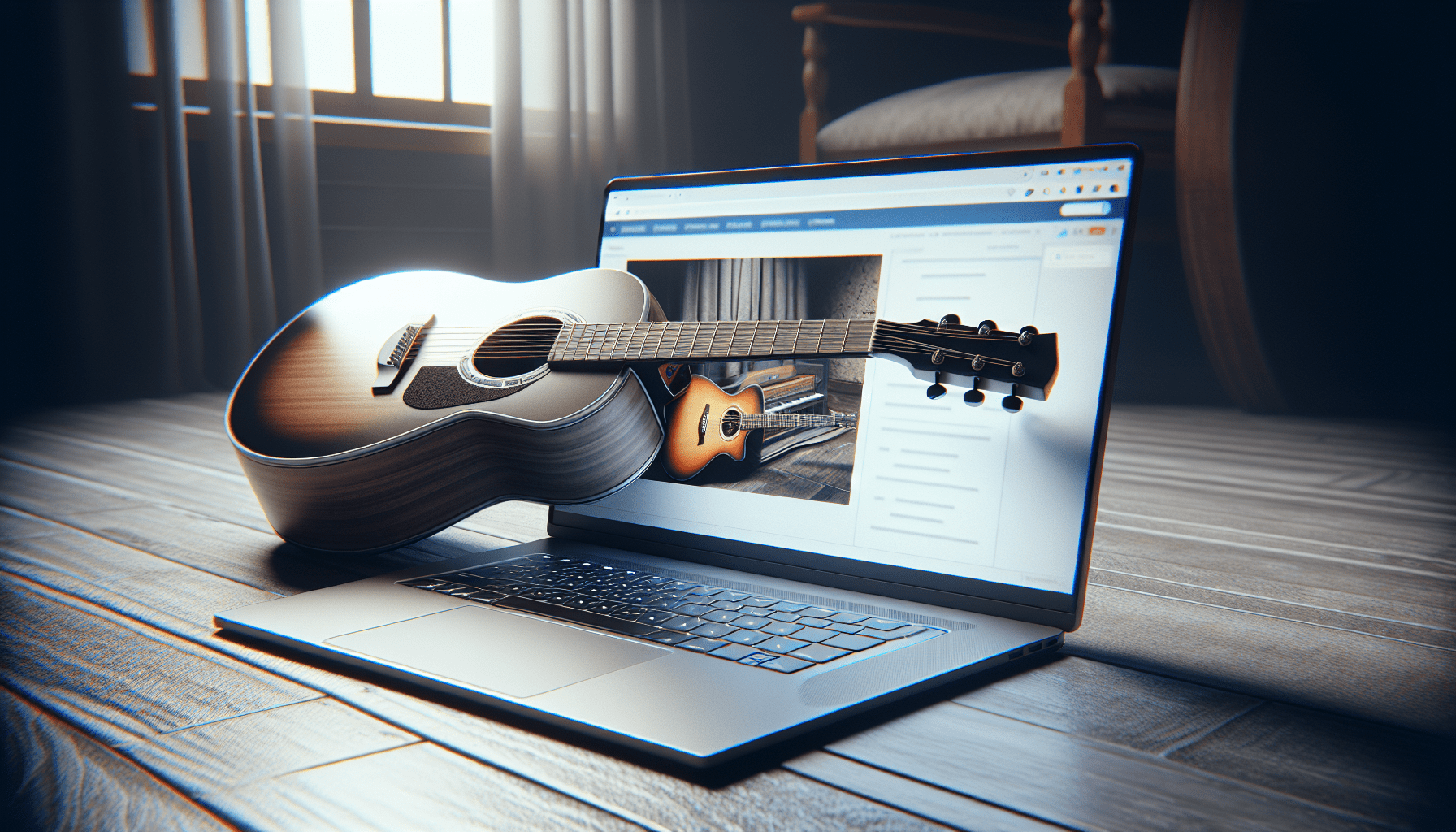Common Mistakes Beginners Make With Online Guitar Lessons And How To Avoid Them
Starting your journey with online guitar lessons can be both thrilling and challenging. It’s easy to make a few missteps when you’re just beginning, but don’t worry! “Common Mistakes Beginners Make With Online Guitar Lessons And How To Avoid Them” provides you with practical advice to steer clear of these pitfalls. From choosing the right lessons and setting realistic goals to maintaining proper technique and staying motivated, this guide ensures you make the most of your learning experience and strum your way to success.
Common Mistakes Beginners Make With Online Guitar Lessons And How To Avoid Them
Have you decided to learn the guitar and are eagerly diving into online lessons? First off, congratulations on starting this exciting musical journey! But as you begin, you may find yourself facing some unexpected challenges. Don’t worry; you’re not alone. Many beginners make common mistakes when starting with online guitar lessons, and we’re here to help you avoid them.
In this friendly guide, we’ll share these common missteps and offer valuable tips to steer you in the right direction. By doing so, you’ll ensure a smooth and enjoyable learning experience. Ready to get started? Let’s go!
Choosing the Wrong Platform
Overwhelmed by Choices
The internet is filled with countless platforms offering online guitar lessons. It’s easy to feel spoiled for choice but picking the wrong platform can set you back.
Solution: Research and Reviews
Take your time to research different platforms. Look for reviews and testimonials from other learners. Platforms offering free trials can also provide a good opportunity to see if the teaching style suits you.
Comparison Table
| Platform | Price | Free Trial | Teaching Style | Extra Features |
|---|---|---|---|---|
| Platform A | $20/month | 1 week | Video lessons | Interactive tabs |
| Platform B | $15/month | 2 weeks | Live lessons, video | Course forums |
| Platform C | $30/month | None | Video and written | Personal feedback |
Skipping the Basics
The Excitement to Play Songs
You might be eager to jump into playing your favorite songs without laying a proper foundation. This may lead to frustration as you struggle with more complex pieces.
Solution: Master the Basics First
Focus initially on mastering the basics, such as chords, strumming patterns, and simple scales. Building a strong foundation will enable you to play songs more accurately and enjoyably down the line.
Not Setting Realistic Goals
Setting High Expectations
Setting unrealistic goals like mastering a song within a week can lead to discouragement. Rome wasn’t built in a day, and neither will your guitar skills.
Solution: Set Manageable Goals
Break down your learning into smaller, achievable goals. Celebrate small victories such as mastering a chord progression or nailing a strumming pattern.
Example Goal Breakdown
| Time Frame | Goal |
|---|---|
| Week 1 | Learn and master the basic open chords (C, G, E) |
| Week 2 | Practice transitioning between basic chords |
| Week 3 | Learn a simple strumming pattern |

Poor Practice Routine
Inconsistent Practice
Practicing sporadically or without a structured approach can slow your progress.
Solution: Establish a Routine
Create a consistent practice routine. Dedicate a specific time each day to practice, even if it’s just 20 minutes. Having a structured plan can help you stay committed and track your progress.
Sample Practice Routine
| Day | Activity | Time Allocated |
|---|---|---|
| Monday | Warm-up, chords practice | 30 minutes |
| Tuesday | Strumming patterns, finger exercises | 30 minutes |
| Wednesday | Learning a new song | 30 minutes |
| Thursday | Review and practice transitions | 30 minutes |
| Friday | Improvisation, free play | 30 minutes |
| Saturday | Consolidation, review the week’s work | 30 minutes |
| Sunday | Rest | – |
Ignoring Finger Exercises
Weak Fingers and Poor Dexterity
Ignoring finger exercises can lead to weak fingers, affecting your ability to play fluidly.
Solution: Regular Finger Exercises
Include finger exercises in your practice routine. Strengthening your fingers will improve your dexterity and allow for smoother playing.
Sample Finger Exercises
- Finger Lifts: Place all fingers on the fretboard and lift them one at a time while the others stay down.
- Spider Walk: Place your fingers on the first fret and move them horizontally along the strings in a spider-like motion.
Neglecting Theory
Playing by Ear
While playing by ear can be helpful, neglecting music theory can limit your understanding of what you’re playing.
Solution: Learn Basic Music Theory
Spend some time each week studying music theory. Understanding scales, chords, and progressions will deepen your musical knowledge and improve your playing.
Basic Theory Concepts to Learn
| Concept | Importance |
|---|---|
| Major and minor scales | Foundation for melody and harmony |
| Chord construction | Helps in understanding the structure and creation of chords |
| Progressions | Essential for song composition and improvisation |

Copying Without Understanding
Mimicking Without Comprehension
Simply copying what you see online without understanding why things are done a certain way can hinder your progress.
Solution: Understand the ‘Why’
Make an effort to understand the reasoning behind techniques and musical concepts. Ask yourself why a particular chord progression works or how a strumming pattern enhances a song’s rhythm.
Forgetting About Posture
Bad Playing Posture
Neglecting proper posture can lead to discomfort or even injury, hindering your ability to play for extended periods.
Solution: Focus on Proper Posture
Maintain a good posture while practicing. Sit upright, hold the guitar properly, and ensure your wrists and fingers are relaxed to prevent strain.
Posture Tips
- Seating: Use a chair with no arms and a straight back.
- Guitar Position: Keep the guitar close to your body and the neck angled upwards.
- Wrists and Fingers: Maintain a relaxed wrist to avoid tension.
Ignoring Rhythm and Timing
Playing Off-Beat
Ignoring the importance of rhythm can lead to you playing off-beat, which can be frustrating especially when playing along with others or a backing track.
Solution: Practice with a Metronome
A metronome helps you keep time accurately. Start slow and gradually increase the tempo as you become more comfortable.
Benefits of Using a Metronome
| Benefit | Explanation |
|---|---|
| Consistent Timing | Helps you keep a steady beat |
| Builds Speed Gradually | Allows you to gradually increase tempo |
| Professional Playing | Ensures you maintain timing consistency in performance |
Being Afraid of Making Mistakes
Avoiding Practice Due to Fear
Fear of making mistakes can prevent you from practicing, hindering your progress and enjoyment.
Solution: Embrace Mistakes as Learning Opportunities
Understand that mistakes are a part of learning. Embrace them as opportunities to improve rather than setbacks.
How to Embrace Mistakes
- Analyze: Understand what went wrong and why.
- Adjust: Make necessary adjustments to improve.
- Apply: Use the lessons learned to prevent the mistake in the future.
Not Seeking Feedback
Learning in Isolation
Learning by yourself without any feedback can make it difficult to gauge your progress or identify mistakes.
Solution: Seek Feedback
Engage with online communities, forums, or even find an online mentor. Constructive criticism helps you identify areas for improvement and stay motivated.
Ways to Get Feedback
| Method | Details |
|---|---|
| Online Forums | Join guitar learning forums and share your progress |
| Social Media Groups | Participate in Facebook groups or other social platforms |
| Online Instructors | Consider occasional lessons with a professional online |
Skipping Warm-Ups
Cold Hands and Stiff Fingers
Starting practice without warming up can lead to cold hands and stiff fingers, making it harder to play smoothly.
Solution: Include Warm-Ups in Your Routine
Spend a few minutes warming up your hands and fingers before diving into practice. This can include finger stretches and simple exercises.
Warm-Up Routine
- Finger Stretches: Stretch each finger gently to increase blood flow.
- Scale Runs: Play simple scales up and down the neck.
- Chord Transitions: Practice transitioning between common chords slowly.
Unrealistic Comparison With Others
Feeling Discouraged
Constantly comparing your progress to others, especially those more advanced, can make you feel discouraged and negatively impact your motivation.
Solution: Focus on Your Own Journey
Remember that everyone progresses at their own pace. Focus on your own improvements and celebrate your achievements.
Perspective Tips
- Track Progress: Keep a journal to track and review your progress.
- Set Personal Milestones: Set and celebrate personal milestones irrespective of others.
- Positive Mindset: Maintain a positive attitude and enjoy the learning process.
Conclusion: Your Unique Journey
Every guitarist’s journey is unique. By recognizing common mistakes and taking proactive steps to avoid them, you can make your learning experience much more enjoyable and productive. Remember, patience and perseverance are your best allies on this journey. So, keep strumming, stay motivated, and, most importantly, have fun with your guitar!
Feel free to revisit this guide anytime you need a bit of encouragement or a reminder of the fundamentals. Best of luck, and happy playing!


Leave a Reply